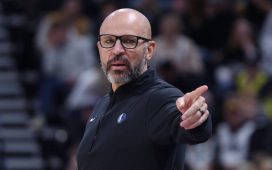The connections in New York City basketball run deep. Generations of boys and young men starred on the playgrounds, the school courts, in the AAU leagues. If you did not play with someone, you probably played against him.
Across the basketball courts of New York, there aren’t many degrees of separation.
It did not take the coronavirus to know this. But the pandemic has reinforced it — fatally.
David Cain, who grew up in Harlem and played basketball for St. John’s in the early 1990s, had a birthday coming, his 49th. He spread word that there would be a party on March 14 at Mom’s Cigar Warehouse in Scarsdale, a suburb north of the city.
Lee Green, 49, a former St. John’s teammate from the Bronx, would serve as the D.J. Dozens of men, mostly in their 40s, most connected to the web of New York City basketball, would come. They found wipes at the door, then relaxed in the leather chairs, shared drinks and food, and soaked in the smoke and camaraderie.
“It was a great, great night,” Cain said. “A beautiful night.”
Ten days later, two of the men were dead from coronavirus, including Green. Jonathan Duck, 50, a big man from the Bronx who played at Iona, also died. He and Cain were AAU teammates and high school rivals.
At least four others who attended the party have tested positive, including Cain, now recovering alone at home. Many others were either waiting for results, Cain said, or monitoring their flulike symptoms.
“The week leading up to it, we were like, ‘Do people even want to come out? Are people scared?’” Cain said. “We weren’t fearing it at this point, or maybe not understanding. I don’t think we understood social distances, for real.”
At least one other New York basketball star has died of coronavirus — David Edwards of Queens, who played a season at Georgetown and then starred at Texas A&M, where he averaged 13.5 points and left as the career leader in assists and steals. He was 48.
Cain and Edwards were backcourt mates in AAU ball. Edwards was already sick before the party. Otherwise, he might have been there, too.
“Three good friends — it’s been a rough week, to say the least,” Cain said on Thursday.
He was home, alone, in Syracuse, N.Y., quarantined from the outside world. The worst of the symptoms had subsided, he said.
“I haven’t heard of anybody else dying at this point, knock on wood,” he said. “But every time you see the phone now, when it’s certain people at certain times …”
The thought dangled. “It’s a mental thing now,” he said.
As the coronavirus has spread around the globe, scientists and politicians have urged or forced social distancing. Highly contagious, the virus can slip easily from one person to the next, even if there are no symptoms. It is how Covid-19 spread from Wuhan, China, in the first place — a small outbreak became a pandemic because people traveled and gave it to one another.
A market in Wuhan. A nursing home near Seattle. A party in Connecticut. Mardi Gras in New Orleans.
A birthday party in Scarsdale, perhaps. It is not known if they got disease there or were already infected, but its toll has devastated their tight-knit group.
New York had its first case on March 1. Suburban New Rochelle soon was locked down by a cluster of cases. There was the introduction of elbow bumping, then there were plans to close restaurants. On March 11, after a basketball player tested positive, the N.B.A. suspended its season. An announcement that schools in New York City would close came on March 15.
But on March 14, a Saturday, there would be a party, in anticipation of Cain’s birthday three days later. Mom’s Cigar Warehouse has a private room that can accommodate 70 people, and at that point there were no restrictions in New York on gatherings of that size.
Mitul Shah, one of the owners, said that he had discussed canceling the party with Cain, and that they had decided to take extra precautions. There would be plenty of cleaning and sanitary wipes, employees would wear gloves, and nobody showing symptoms of a cold or flu would be admitted.
Shah said the March 14 party was the last private one held at Mom’s Cigar Warehouse. Like other New York businesses, it remained open for another week, until all nonessential establishments were ordered to close.
Shah questioned whether the party was the source of the spread. Cain is certain of it.
“It’s too coincidental that it wasn’t from there,” he said. “It’s not the place that was the problem. It was amongst us.”
The party was almost exclusively men, the room filled with “30-year friendships,” Cain said.
Green, who retired from the New York City Police Department a year ago, fired up the music. Being a D.J. was a lifelong hobby of his. His nickname, picked up through his on-court exploits at Harlem’s Rucker Park, was El Dorado.
In February, Green was at Madison Square Garden for a St. John’s game, reveling in a reunion with his former teammate, and roommate, Lamont Middleton.
Middleton grew up in the Bronx and now lives with his family in North Carolina. He surmised that there would have been little hope, for anyone, of talking Green out of serving as the D.J. at Mom’s Cigar Warehouse. Middleton laughed as he recounted how hard it was to persuade Green to turn his music down when they shared a cramped space in college — even when Middleton had to study.
“At St. John’s, that was his thing,” Middleton said. “We used to kind of, like, fight sometimes.”
He was not surprised that the party took place amid the viral threat.
“We’re New Yorkers,” Middleton said. “Just being from New York, you get stubborn. Then a week later, it’s a whole different world.”
Cain began to feel ill a few days later — a fever, chills and sweats, he said. A test for the flu was negative. When he told doctors that he had been in the New York City area at a party, they tested him for coronavirus.
As he waited several days for the results, Cain learned that another person at the party had tested positive. When he got his own result back, on Sunday, he spread the news again — quarantine yourself and get tested.
He did not know that, by then, Green was in the final throes of the virus. He had felt sick all week, mostly with a cough. When his fever spiked on March 20, he went to the hospital.
He was tested for coronavirus, his family said, and was told the results would take some time. He went home. He lived alone.
“I’m not going to lie,” he texted to his daughter, Bria Natalie Green, 26, one of his four grown children. “I was scared to death.”
It was the last text she got from her father. On March 22, Green called his sister, Aiyana Green, in New Jersey, using FaceTime. It was her birthday.
“He called me and I could tell he wasn’t feeling well,” she said. “He said, Happy birthday, sis. I said, you look a mess. He said, I know, I feel crazy. I can’t even walk to the kitchen right now. I can’t breathe.”
By the time she could get to the Bronx, he had texted to say he was on the way to the hospital. Which one? she asked. Einstein, he wrote. It was their last communication.
Just a week or so earlier, Aiyana Green’s phone had died. Lee, eight years older, was concerned that he could not reach her over several hours. He went to New Jersey to bang on her door at 2 a.m. to make sure she was OK.
“He was the best big brother,” she said.
She rushed to the hospital, but could not get inside.
“I just wanted to hold his hand, I wanted to be near him,” she said, crying as she retold the story. “I kept telling the doctor, if you keep saying my name to him I promise he’s going to live. Keep saying Aiyana, Aiyana, Aiyana. Please. But I know they were so overwhelmed.”
She spent much of Thursday figuring out funeral and burial plans. They will be limited to 10 people.
Had Green, Duck or Harris died any other way, at any other time, the New York basketball community would hold big funerals, big celebrations of life.
Family members of Duck and Harris did not respond to messages. But the Green family wanted to get a message out.
“I want people to stay inside so we can get through this a lot faster and I can personally get out of this nightmare,” Green’s daughter, Bria Natalie, said. She cried. “I want people to know my dad was loved by all, and he wanted people to love each other. And I would do anything to have him back.”
Aiyana Green does not blame the cigar party for her brother’s death. Just a couple of weeks ago, talk of the spreading virus was mostly about the elderly and the ill. It was not about basketball players in middle age.
“My brother must have thought that — that he didn’t fit the mold,” she said. “That it was OK to be amongst his friends.”
In Syracuse, Cain remains in isolation at home. His sadness is blended with guilt. He wonders how many others got the virus that night, and how many people they spread it to.
“That virus ran through at least 10 people that night, and that’s just what I know of,” Cain said. “It’s not a joke.”
Kitty Bennett and Sheelagh McNeill provided research.





